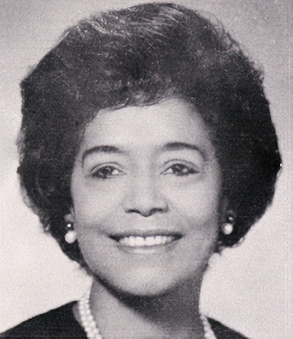Josephine Dobbs Clement facts for kids
Quick facts for kids
Josephine Dobbs Clement
|
|
|---|---|

Clement in 1975
|
|
| Member of the Durham County Board of Commissioners | |
| In office 1984–1990 |
|
| Member of the Durham City Board of Education | |
| In office 1973–1983 |
|
| Personal details | |
| Born |
Josephine Ophelia Dobbs
February 9, 1918 Atlanta, Georgia, U.S. |
| Died | March 23, 1998 (aged 80) Atlanta, Georgia, U.S. |
| Political party | Democratic |
| Spouse |
William A. Clement
(m. 1941) |
| Parents |
|
| Relatives |
|
| Education |
|
Josephine Ophelia Dobbs Clement (born Dobbs; February 9, 1918 – March 23, 1998) was an important American politician, teacher, and civil rights activist. She worked hard to make things fair for everyone. She was the first Black woman to serve on the Board of Education in Durham, North Carolina.
Contents
Early Life and Education
Josephine Ophelia Dobbs was born on February 9, 1918. Her hometown was Atlanta, Georgia. She was the fourth of six daughters. Her parents were John Wesley Dobbs, a community leader, and Irene Dobbs.
Josephine went to Spelman College and graduated in 1937. Later, she earned a Master of Arts degree. This degree was in home economics from Teachers College, Columbia University. She started her career as a teacher. She taught at Morris Brown College and Savannah State University in Georgia.
In 1941, Josephine married William A. Clement. In 1946, they moved to Durham, North Carolina. There, she continued teaching at North Carolina Central University.
Fighting for Fairness
In the late 1940s, Josephine and William Clement took action. They filed lawsuits to challenge unfair treatment in schools. This was part of the fight against racial discrimination.
In 1958, Clement and 15 other Black women leaders in Durham started a local chapter of The Links. This is a national organization that helps communities.
A Career in Politics
In 1971, Clement was chosen to join a special group. This group studied if Durham City and Durham County should combine their governments. Their idea was not approved by voters in 1974.
Joining the School Board
In 1973, the Durham City Council chose Clement for the Durham City Board of Education. She made history as the first Black woman to serve on this board. In 1975, the city council asked the state government to make the school board elected by the people. This change happened in June of that year.
Clement was re-elected to the school board in 1975 and 1979. The board then became the first in North Carolina with a majority of Black members. In 1978, she became the first Black woman to lead the board as its chair. She held this important role for five years.
Serving the County
Clement was appointed to the Durham County Board of Commissioners in 1984. She was elected to the board in November 1984. She served three terms, which means she was on the board until 1990.
Personal Life and Family
Josephine Dobbs married William A. Clement on December 24, 1941. William had a daughter named Alexine from his first marriage. Josephine and William had five children together. They had three sons: William A. (born 1943), Wesley Dobbs (born 1946), and Arthur John (born 1948). They also had two daughters: Kathleen Ophelia (born 1957) and Josephine Millicent.
Her Passing
Josephine Dobbs Clement passed away on March 23, 1998. She was 80 years old.
Her Lasting Impact
Josephine Dobbs Clement's work continues to inspire people.
Awards and Honors
In 1995, the Durham Public Education Network created an award in her honor. It's called the Josephine Dobbs Clement Award. This award is given every year to someone who shows great leadership in public education.
A School in Her Name
In 2004, a new school opened called Josephine Dobbs Clement Early College High School. This school is a partnership between Durham Public Schools and North Carolina Central University. It was named after Clement to honor her.
Cecelia Steppe-Jones, a former dean at North Carolina Central University, explained the choice. She said the planners wanted a name of someone who truly cared for children. Clement's name was chosen because she was a strong supporter of public education, a social activist, and a great leader.
 | Ernest Everett Just |
 | Mary Jackson |
 | Emmett Chappelle |
 | Marie Maynard Daly |

